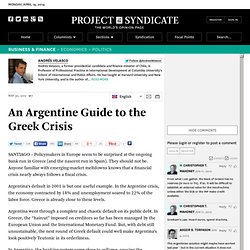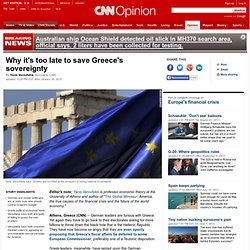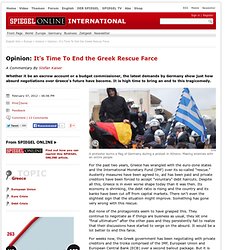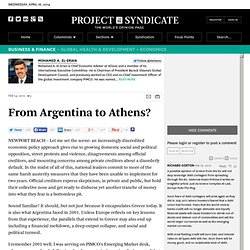

Piraeus Greece, Piraeus Port of Athens. "An Argentine Guide to the Greek Crisis" by Andres Velasco. Exit from comment view mode.

Click to hide this space SANTIAGO – Policymakers in Europe seem to be surprised at the ongoing bank run in Greece (and the nascent run in Spain). They should not be. Anyone familiar with emerging-market meltdowns knows that a financial crisis nearly always follows a fiscal crisis. Argentina’s default in 2001 is but one useful example. Argentina went through a complete and chaotic default on its public debt. In Argentina, the banking system came close to collapse, causing the government to ban bank withdrawals – introducing the so-called corralito, or bullpen, for deposits – and establishing capital controls.
To answer that question, it helps to recall the feedback loops that link fiscal and financial crises. That is the link running from budget to bank problems. These mutually reinforcing forces can work themselves out in a lengthy process of recession and deleveraging. What happens if Greece is cut off from EU and IMF credit? Greece: The history behind the collapse - Georges Prévélakis. Historically positioning themselves between an unruly, oriental population and the western powers, since 1981 Greek elites have siphoned off EU funds into a bloated public sector favouring corruption, patronage and social climbing.

The threat posed to Europe by the breakdown is less contagion to the centre than a wave of anti-western feeling that could exacerbate geopolitical instabilities in the region. It all started two years ago, in the autumn of 2009. Why it's too late to save Greece's sovereignty. Yanis Varoufakis says Greeks are horrified at the prospect of losing national sovereignty.

German and Greek politicians are at odds over who should control Greece's budgetGreek political economist Yanis Varoufakis says both are guilty of failing to grasp the real problemVaroufakis says both countries mislead voters in agreeing an unsustainable rescue package for Greece Editor's note: Yanis Varoufakis is professor economic theory at the University of Athens and author of "The Global Minotaur: America, the true causes of the financial crisis and the future of the world economy. " Athens, Greece (CNN) -- German leaders are furious with Greece. Yet again they have to go back to their electorates asking for more billions to throw down the black hole that is the Hellenic Republic. They have now become so angry that they are even openly proposing that Greece's fiscal affairs be deferred to some European Commissioner, preferably one of a Teutonic disposition.
Yanis Varoufakis Something must give. Opinion: It's Time To End the Greek Rescue Farce - SPIEGEL ONLINE - News - International. For the past two years, Greece has wrangled with the euro-zone states and the International Monetary Fund (IMF) over its so-called "rescue.

" Austerity measures have been agreed to, aid has been paid and private creditors have been forced to accept "voluntary" debt haircuts. Despite all this, Greece is in even worse shape today than it was then. Its economy is shrinking, the debt ratio is rising and the country and its banks have been cut off from capital markets. There isn't even the slightest sign that the situation might improve. Something has gone very wrong with this rescue. But none of the protagonists seem to have grasped this. For weeks now, the Greek government has been negotiating with private creditors and the troika comprised of the IMF, European Union and European Central Bank (ECB) over a second bailout package.
It is time for politicians to admit that their carrot and stick strategy has failed. Broken Promises. New Economic Perspectives: Greece: A Default is a Better Outcome Than the Deal on Offer. By Marshall Auerback Pick your poison.

The eurozone, the ant and the grasshopper. Another summit, another "bailout" for Greece.

Today's Brussels' agreement commits another mountain of euros to a cause that most think was lost some time ago. Europe seems to be caught up in an awful dilemma: cut Greece loose (possibly together with at least one of the other PIIGS - Portugal, Italy, Ireland, Greece and Spain - or keep throwing good money into a black hole. From Argentina to Athens? - Mohamed A. El-Erian. Exit from comment view mode.

Click to hide this space NEWPORT BEACH – Let me set the scene: an increasingly discredited economic policy approach gives rise to growing domestic social and political opposition, street protests and violence, disagreements among official creditors, and mounting concerns among private creditors about a disorderly default. In the midst of all of this, national leaders commit to more of the same harsh austerity measures that they have been unable to implement for two years. Official creditors express skepticism, in private and public, but hold their collective nose and get ready to disburse yet another tranche of money into what they fear is a bottomless pit. Sound familiar? 'The Troika's Policies Have Failed': European Doubts Growing over Greece Debt Strategy - SPIEGEL ONLINE - News - International. It would have been hard for German Chancellor Angela Merkel to find a more appropriate setting from which to promote her policies for Greece.

She is sitting in a wide leather chair in Berlin's Neues Museum, home to Egyptian treasures and classical antiquities. The ancient columns towering behind her lend the scene an Acropolis-like air. It's Tuesday of last week, and Merkel has been invited by a foundation to join in a discussion on the future of Europe. A young woman stands up and identifies herself as a foreign student studying in Germany and a "despairing representative of a younger Greek generation. " She says that, of course, she would like to return to her home country after completing her studies. Merkel nods. Greece Is on Pace for the Worst Recession in Modern History - Derek Thompson - Business. If only the country's deeper crisis ended there Reuters The Greek economy shrank nearly 7% in 2011, the fifth straight year the country has been in a recession.

GDP has shriveled by a sixth since 2006, and unemployment has tripled over that period to 20%. With new rounds of austerity just announced, and a default yet to come, the nightmare isn't even close to being over. Note from Athens: Feeling on the ground has palpably changed « Euro Area Debt Crisis by Megan Greene. I travel to Athens about once every six months and speak with as many contacts as I can, including top policymakers, bankers, journalists, economists and academics.

On my most recent trip in mid-February, the feeling on the ground had palpably changed in a number of ways that have supported my view that Greece will eventually default and exit the eurozone, but probably not before late 2013. Sorrow and bitterness There has been a pronounced shift on the ground in Athens in terms of the sorrow and bitterness that Greeks express.
Without exception each of the Greeks with whom I spoke—whether government officials or simply engaged citizens—expressed significant concern about the generations above and below them. "Greece’s Soft Budgets in Hard Times" by Daniel Gros. Exit from comment view mode. Click to hide this space BRUSSELS – The first de facto default of a country classified as “developed” has now taken place, with private international creditors “voluntarily” accepting a “haircut” of more than 50% on their claims on the Greek government. As a result, Greece now owes very little to private foreign creditors. Greece also agreed to even more stringent budget targets and, in return, received financial support of more than €100 billion ($134 billion). Greece Is Still Doomed: Why the New Bailout Is a Fantasy - Derek Thompson - Business. Europe kicks the can down the road, while Athens continues to burn Reuters.
Experts react to Europe’s bailout package for Greece. Late Monday night, the euro zone agreed to a $170 billion bailout package for Greece in exchange for certain budgetary oversight measures and economic reforms. We asked a group of experts and economists to weigh in on the deal — and whether it’s enough to hold Greece — and Europe — together. Here are their reactions: Greece is bailed out — for now. (YIORGOS KARAHALIS/Reuters) Kevin Featherstone, professor of contemporary Greek studies at the London School of Economics: S&P : Greece in 'selective default' on bonds. Tuesday 28 February 2012 10.08. "Who Lost Greece?" by Jean Pisani-Ferry. Exit from comment view mode. Click to hide this space BRUSSELS – The blame game in Europe has not yet begun. An agreement between Greece and its private creditors and public lenders will enable it to meet its next debt repayment deadline of March 20. The Europeans should be commended for a significant step in the direction of realism.
Private creditors have accepted a haircut of more than 50% on their claims and a lowering of interest rates, bringing the total debt relief to more than two-thirds. But, while a solution was found in extremis, many people believe that it will merely postpone the day of reckoning,& as Greece will not implement the promised austerity, and will end up either deciding to exit the eurozone or being pushed out following an eventual default.
Greece - Cutting out the Middle Man. It seems that central bankers and politicians are endlessly resourceful when it comes to innovating ways to profit themselves and bankers at everyone else's expense. Where I had thought Greek default inevitable just two weeks ago, I no longer think so today. It appears that Sarkozy, Merkel and the Troika have decided to prevent a default regardless of what Greek politicians or citizens may choose to do. The Greeks Get It - Chris Hedges' Columns. The Greeks Get It Posted on May 24, 2010 By Chris Hedges. So, what would your plan for Greece be? Reading the media and blogs, it seems to me that left and right are united in the view that the Greek default is being handled appallingly, that the current attempts at a solution are childishly obviously wrong and that everything is the fault of someone, probably the Germans.
My own view – that it is not at all clear what the direction of policy is, and that although I don’t agree with the troika plan, it’s recognizable as a good-faith plan made by conscientious international civil servants working under unimaginably difficult political constraints in an economic context that was irreparably broken before they got there – is, as always, unpopular. The illegitimacy of demands - Demetra Kotouza. With demands over the wage and welfare in austerity Greece deemed illegitimate because unaffordable, what shape can struggle take? Demetra Kotouza sees the all-out attack on living standards as producing a de facto opposition that can't be cohered by ideologies of class.
With austerity escalating in Greece this year, there has been a parallel effort to resist it. Several strikes in key industries such as transport and electricity have taken place, mostly in the public sector, and six general strikes, accompanied by demonstrations of growing size and intensity. The "indignants" direct democracy movement dominated attention in the summer, expressing parliamentary politics' legitimation crisis. Elite hauteur: Greece, Niger and the IMF. Greeks withdraw $894 million in a day: Is this beginning of a run on banks? "Greece and the Limits of Anti-Austerity" by Mark Roe. And now what? Greece after its official creditor-led default.
How a Radical Greek Rescue Plan Fell Short. "The Greek Tragedy, Act II" by Luigi Zingales. Exit from comment view mode. "Who is Responsible for the Greek Tragedy?" by Mohamed A. El-Erian. Exit from comment view mode. The 64 trillion euro question... While I was on the road last week, I see that Greek elections managed to accomplish two things: 1) A requirement for yet more Greek elections; and 2) A recognition among European banking officials that this time, Greece might actually be leaving the eurozone. Greekonomics. Why Greece Needs to Leave the Euro Zone. The euro crisis: The Greek run. "Greece Must Exit" by Nouriel Roubini.
5 Easy Ways to Solve the Greek Crisis - By Daniel Altman.